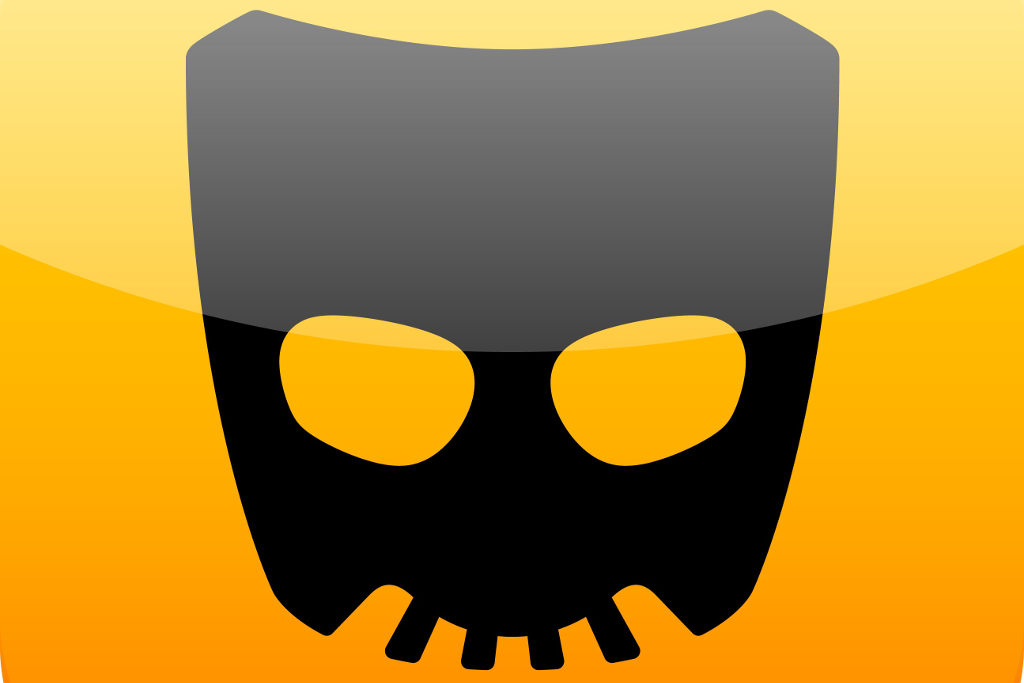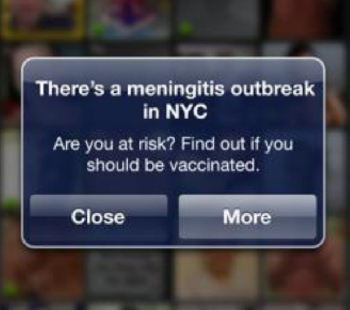Blaming A Deadly Disease On Grindr Is A Dangerous Thing To Do
A new strain of meningococcal continues to claim the lives of gay men in New York. It's important to raise awareness, sure - but we're doing it wrong.

“Did Grindr cause New York’s deadly meningitis outbreak?” screamed Slate’s Twitter, and a familiar weight yolked itself around my neck.

“CLICK BAIT CLICK BAIT” sounded my internets-alarm, but it was too late. I hooked in, and discovered that we silly gay men are responsible for YET ANOTHER life-threatening infection being unleashed upon the world — all because we can’t keep it in our pants.
Of course all news sites need to cut through the web’s white noise, but is it responsible to point fingers when so many of us take our news in 140 characters or less? And, given Brooklyn is the new Bali, how long before NY-bound Australians join the moral panic?
Check Yourself Before You Wreck Yourself:
Here’s what we know. A new strain of meningococcal in NYC has been building momentum since 2010, with 22 cases reported and 7 fatalities so far — all of whom happened to be gay men. Meningococcal is a form of severe bacterial meningitis with fast-acting symptoms, and if left untreated it can quickly result in lost limbs and potential loss of life. Not to be confused with the less severe viral meningitis, meningococcal is one of those terrifyingly quick infections that kills off Gwyneth Paltrow characters in disease-porn movies. It is spread via close bodily contact (sexytimes or similar), and also (but not as easily) from that age-old harbinger of death and disease: sharing a drink. It has been widely reported on by major media outlets like the New York Times, who are attributing its spread to anonymous sexual encounters between gay men, facilitated by “internet chat rooms or digital apps or at parties”.
In the face of this outbreak, the NY Health Department have set up temporary vaccination stations within gay clubs (trust me, that’s a much preferable little prick to get jabbed with on the dancefloor). They have also issued a notice recommending vaccinations for all men “who regularly have intimate contact with other men met through a website, digital application (“App”), or at a bar or party.” And they’ve taken to placing pop-up ads on Grindr, urging men in the area to get vaccinated.

But What Is A Grindr?
What a delicious double whammy perfect for the 21st century: sex and technology. For anyone who doesn’t have a gay man in their life, you may not have heard about gay hookup apps like Grindr. Or Scruff. Or Mister. Or Manhunt. Or Dudesnude. Or Squirt. Or BBRT… The list goes on. You can access all of them on your phone, and they use GPS (“Global Penis Searcher”?) to alert you to the closest men who are up for getting down. We use them, and we use them with aplomb; Australian gay men are the fourth-highest Grindr users, behind the UK, USA and France — and Sydney and Melbourne are in the top ten cities. Initial testing on our community went so well that there are now lesbian and heterosexual versions as well (to varying degrees of success).
Gay men have been leaders in finding new ways to get laid since, oh, forever. Partly because sex is something that defines us, and emboldens us. When you grow up being told your biological impulses are depraved, immoral and unnatural, you tend to find strength in the “rebellion” of intercourse. That rebellion creates a community, and that community needs to come together somehow, despite being pushed into a dark corner. Before apps there were (and continue to be) bathhouses, cottaging/beats, back-rooms, personal ads, gyms — any place in which men could gather to exchange ideas* (*bodily fluids).
I live in Potts Point, part of the so-called “gay ghetto” of Sydney. I switch on my in-phone apps and my screen lights up with eligible bachelors, time-wasters, and boyfriend material. I use those apps to seek out sex with like-minded men, and have succeeded a number of times. Those apps are also used by Australian health organisations like ACON or Positive Living to reach their target audience, and spread important information.
Have I ever been judged by heterosexual or monogamous/sex negative/sex neutral homosexuals for my use of Grindr as an indicator of my promiscuity or “gay weakness”? Absolutely.
The New York Health Department’s targeting of Grindr could be seen as a relatively quick, direct response from a national office that was not so quick to move on previous crises. But the issue’s a little more complicated than that.
DISEASE! DEATH! DUDES WHO DO DUDES!
Gay men in NYC are being affected by meningococcal. Gay men use apps to procure sex. In doing so, the scatter range for outbreaks like meningococcal increases, as men move around from one hookup to another — from uptown to downtown, Brooklyn to the Bronx. If gay men are going to continue their sexual activity, then the government should respond to that pattern of activity the best way they can. Right?
Well, while they are not necessarily being incendiary in their advice, a sensitive response from the government is vital when sexual freedom and intimacy is at stake. As seen by the click-bait offered by Slate, even the most delicate handling of an issue can become sensational when reduced to a Tweet. There’s been criticism of the Health Department’s targeting of apps used by gay men for sex — especially since the same department infamously (almost criminally) dropped the ball under a national directive in the 1980s when the AIDS crisis was at its peak, resulting in 70,000 deaths in the Reagan era alone. Anger towards the lack of action lead to the famous SILENCE=DEATH campaign – and an understandably heightened sensitivity around any form of blame when it comes to gay men and communicable disease.
To figure out how gay men in the middle of the outbreak felt, I spoke with a Brooklyn local I know. David and I “met” via Grindr, when I was in New York last summer. To do this interview, David and I chatted via another app, Scruff, which is just like Grindr except less twinky and, generally, hotter. I asked David if the large, multi-faceted community of “NY gay men” were aware of the outbreak.
“I think most gay men I know know about it and are freaked out by it. Does that mean that hooking up happens less? Don’t think so,” he said. While an informed decision from the Health Department, the targeting of apps and the men who use them “paints a picture that is not the whole story. If there is something to learn in the treatment of this issue, I think it’s that government agencies are not good at nuanced response … and the effects of that can be negative, especially as it relates to public opinion and sentiment about the issues.”
While he notes that the Health Department are acting responsibly and making an effort, David refers to the targeting of apps as “a kind of choreographing of public gestalt about who has this, how they get it and, most importantly, how some [straight people] don’t have to worry about getting it. Gays that use the app may have more partners — fair enough — but sexual contact is not the only way it is transmitted.”
And herein lies the rub. For a news organisation like Slate to point to Grindr et al as the cause of an outbreak, it neatly and concisely transfers blame and risk to gay men. Specifically, the promiscuous ones. In an era where the battle for marriage equality means, for some, the dumbing-down or heteronormalising of gay sex lives, headline grabs like Slate’s draw a deeper line in the sand between “good” (monogamous) and “bad” (polyamorous) gays.
The most frustrating thing is that the article itself presents a balanced view of the issue. It calls for level-headed common sense in appropriating the new modes of distribution in the gay community (like apps) to spread information. It also details the history of AIDS that has lead to sensitivity surrounding the perception of gay men and sex. But all that complexity doesn’t fit neatly in a tweet, and it doesn’t inspire the click-through that drives web traffic.
“Did Grindr cause New York’s deadly meningitis outbreak?”, Slate’s Twitter asked. The problem is that most people still didn’t click, and the headline became the news.
Should I Be Worried? Will I Die?
If previous outbreaks taught us anything, it’s that infectious diseases rarely stay in one particular community; ultimately, not only gay men are at risk. And it’s now summertime in NYC and that means one thing: Australians!
If you’re a gay man, or a man who has sex with other men (MSM for short), yes, be careful. If you’re a HIV positive gay men, definitely (12 out of the 22 cases of the virus have been poz men, including 5 of the 7 who died). Should you delete those racy apps off your phone before disembarking at JFK? No.
If you’re in one of those categories, and are off to New York, a vaccination is available. ACON have issued a travel warning, and are disseminating information relating to the outbreak, vaccination periods and other health info that is worth looking at before you fly (for HIV+ men, eight weeks is required for vaccination turnarounds).
Don’t fall into those categories? Well then based on the evidence of infection, you don’t need to run to your doctor demanding a vaccination. What is required to achieve peace of mind before embarking on your summer of Pabst/beards/living like Carrie Bradshaw Hannah Horvath is ultimately your call. How you interpret moral panics started by dangerously sensationalism is also your call.
When we sit outside a particular community and they experience a pandemic, or social injustice, or any other terrible thing, it can be too easy to judge why that particular community was affected. Sex has been used as a weapon by and against the gay community throughout our entire history. Technological advances in the exchange of sex (e.g. Grindr) are not responsible for disease or death, any more than the men who use them are. When people are made to feel ashamed for their natural impulses, it can only lead to more silence, more alienation, and more mistakes. Modern technology has created the click bait culture, but how we use it to sell stories should never be at the cost of a community.
–
Nic Holas mainly fills his time with the creative management of performance, media, and the arts. His writing has appeared in Hello Mr magazine and Cosmopolitan. You can find him on Twitter @longlivecanapes, or living out his fantasy life as a celebrity attache at utauberkoolja.com.